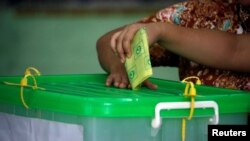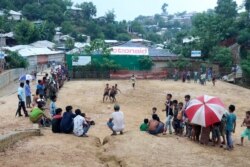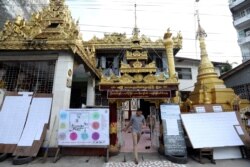As Myanmar prepares for a general election in November in the face of increasing ethnic and religious tensions, Buddhist, Christian and Muslim religious leaders are calling for a new peace initiative before it is too late.
In an appeal letter, nearly 50 religious leaders and faith organizations spoke out Monday about Myanmar’s growing violence and “senseless divisions.”
One of the signees, Badata Seindita, told VOA that the call for healing in the country was “long overdue,” stressing that conflict has taken a toll on the country’s people.
“I cannot understand why all armed groups cannot simply think of achieving peace,” said Seindita, who leads the Asia Light Monastery in Pyin Oo Lwin. “We urge all concerned parties to stop war as soon as possible.”
Since its independence from British rule in 1948, Myanmar has faced a series of ethnic and religious issues, particularly in the western coastal state of Rakhine and neighboring Chin. The conflict triggered the Myanmar army’s deadly campaign against Rohingya Muslims in 2017, called by the United Nations a "textbook example of ethnic cleansing” that has displaced nearly 1 million people into Bangladesh.
The religious leaders’ letter, initiated by Cardinal Charles Bo, the archbishop of Yangon, said the country needed to turn its focus from civil war to address the coronavirus pandemic, climate change and wildfires. It said the three global challenges presented “a golden opportunity” for the country’s factions to come together to fight common enemies.
“We are weary of war, worn down by enmities,” said the letter, addressing Myanmar’s civilians, ethnic groups, armed militants, political parties and religious chiefs.
“Despite the beauty of diversity, Myanmar people cling to the folly of assuming a ranking in ethnic differences,” the appeal read.
Al Haj Kalifah U Aye Lwin, who signed the appeal as the chief convener of the Islamic Center of Myanmar, warned that Myanmar’s conflict was damaging the country’s natural resources, leaving many youths with no job opportunities. He said the religious initiative aims to encourage the country’s political leaders to come to the negotiating table during the global pandemic.
“Coronavirus gives us a chance to take new paths,” Lwin told VOA, adding, “Myanmar people face [the] pandemic with unity to ward off and take this inspiration as an opportunity to seize it.”
Kyaw Thu, an adviser for the All Myanmar Hindu Central Council and another signee of the letter, told VOA that Myanmar’s government, military and armed groups needed to pursue an agreement that can guarantee stability in an inclusive society.
“Let a new Myanmar of hope, peace and prosperity dawn as we march towards the goal of democracy through elections,” Thu said.
Myanmar is scheduled to hold its parliamentary election on November 8. The vote, which includes conflict zones, is seen by many as a significant test for the country’s troubled transition to democracy.






